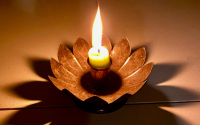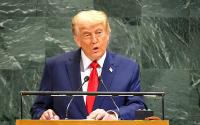BAGHDAD, Iraq - Business is booming at the Baghdad morgue.
Before the war, before the fall of Saddam Hussein's government, seven or eight bodies arrived each day at this nondescript building in northeastern Baghdad for autopsies. Most deaths resulted from car crashes or other accidents. Killings were rare, and gun violence rarer still, a testament to the monopoly that Mr. Hussein held on the use of force.
Now the paper-and-cardboard ledgers where the autopsies are logged are torn from overuse. On an average day, the morgue receives 20 to 25 bodies, the human cost of the post-war wave of crime and insurgency engulfing the city.
"The unexpected change is an increase in bullet injuries," said Dr. Abdul Razzaq al-Obeidi, one of the morgue's chief doctors. "Mostly vengeance." In the first eight months of this year nearly 3,000 people in municipal Baghdad, which has about five million residents, have died from gunshot wounds - nearly all homicides, Dr. Obeidi said. A surge of killings in September has only increased the pressure.
The murder rate rose this summer, defying more than a year of promises from the American authorities about the increasing effectiveness of the Iraqi police and security forces.
The Baghdad Forensics Institute, which runs the morgue, has added doctors, but still the bodies pile up. On a recent Monday, one autopsy room was filled with bodies, while others awaited examination on stretchers that lined the walls in a grim, unrefrigerated waiting area.
"Sometimes we don't have anyplace to keep the bodies in the refrigerators because it's full," said Dr. Muthana Abdullah, a postgraduate student completing his final year at the forensics institute, which conducts autopsies and medical examinations used in court cases in the Baghdad area.
The parade of bodies is depressing and dehumanizing, Dr. Abdullah said. He worries that seeing so much death will one day leave him traumatized. "I am a human being, like you," he said. "It's very difficult, but it's my work."
Besides doing autopsies, the doctors at the institute specialize in the examinations of women accused by their husbands of not being virgins when they married, a serious charge that can lead to an annulment.
The doctors also examine men accused of homosexuality, a criminal offense in Iraq. They must also approve all marriages of girls 14 or younger, verifying that they have reached puberty and are physically capable of intercourse.
Nearly every case seems to stop at least briefly in the office of Dr. Obeidi, who is the deputy director of the forensics institute and oversees autopsies and marriage examinations.
A 52-year-old man with wide plastic glasses and a quick smile, Dr. Obeidi seems to savor his job, despite the daily procession of misery. Asked about unusual cases, he recounted the case of a doctor at the institute who had been killed by an unusually large bullet to the liver. He disappeared into another office for a moment, reappearing with a blue plastic envelope. "A very large-caliber bullet," he said, unwrapping the slug on his desk.
Dr. Obeidi says his biggest complaint is that he and his fellow doctors are not paid enough. He receives $440 a month. Iraqi judges are paid $900 to $1,400 a month, he said. Forensic work is vital to court cases, so he should be paid as much as a judge, he said.
All the doctors, including those who conduct the vaginal examinations, are male, although a female nurse is present during those exams, Dr. Obeidi said.
Before the war, the institute received 200 to 250 bodies a month, with fewer than 20 gunshot deaths, said to Abbas Mustafa, who keeps records at the morgue. In January 2003, the morgue received 246 bodies, including those of 17 gunshot victims.
The deaths began to soar in April 2003, when looting racked Baghdad, and have remained high ever since. Including killings and accidental deaths, the morgue has performed 5,239 autopsies so far in 2004, an average of about 650 a month, with more than half of them gunshot victims.
The highest monthly total ever came in August 2003, when the morgue took in 875 bodies, including 522 gunshot deaths, Mr. Mustafa said. Last month, 696 corpses arrived for autopsy, including 386 gunshot victims. Men make up about 90 percent of the shooting victims, he said.
Before the war the morgue had only three doctors, Dr. Obeidi said. Now, with the collapse of the Iraqi Army, eight former military doctors have joined the staff, enabling the morgue to perform autopsies quickly.
The forensic workers appeared to treat the bodies with respect. They are typically covered with blankets or left naked.
The building has a single set of doors and flies buzz freely inside it. Workers wear no protective gear, uniforms or even gauze face masks, although some wear gloves and ill-fitting white boots. The heavy stench of bodies fills the building.
In an adjoining building a few feet away, two police officers kept watch on a half-dozen women accused of prostitution who were awaiting examination. At least two of the women had been found in the International Zone, the area in the center of Baghdad that is secured by the American military and is home to the Iraqi government and the United States Embassy.
In a room at the end of the hall equipped with an examination table, a young girl awaited an inspection, accompanied by her mother and sisters. The procedure is painless and takes only a few minutes, said Nedhal Hussein, the chief nurse.
"I try to calm them down," Ms. Hussein said. "Then we test them and they go. That's it."
The inspections are better than autopsies, Dr. Abdullah said. "There are so many problems we face here every day," he said. "The department of the living is better than the department of the dead."
7 Iraqi Guard Applicants, 4 U.S. Marines and a Soldier Are Killed By Edward Wong The New York Times
Sunday 26 September 2004
BAGHDAD, Iraq - Seven Iraqi men applying for jobs with the Iraqi National Guard were ambushed and killed in western Baghdad on Saturday morning, while the United States military said four marines and a soldier had been killed over 24 hours.
The military also said it conducted two airstrikes early and late on Saturday in the volatile city of Falluja to kill militants holding meetings. The military said the targets were members of the network led by Abu Musab al-Zarqawi, the Jordanian militant.
The Americans did not give any casualty estimates, but doctors in the emergency room of the main Falluja hospital said 9 people were killed in the first strike and 16 wounded, all of them civilians. They said the first strike took place in a residential area of eastern Falluja and one woman and a child were among the dead.
In its statement, the American military said, "There were no innocent civilians reported in the immediate area at the time of the strike." Though the military always labels such attacks "precision strikes," doctors and residents in Falluja routinely say the assaults kill civilians. Because of the danger of entering Falluja, a city controlled by insurgents, foreign reporters are unable to verify the assertions of either side.
Insurgents control much of Anbar Province, a parched Sunni-dominated area that lies immediately west of Baghdad and includes the restive cities of Falluja and Ramadi. American marines are dying in combat there at an average of one or more a day.
The military said Saturday that four members of the First Marine Expeditionary Force were killed in separate hostile incidents on Friday.
The First Cavalry Division, charged with controlling the capital, said a soldier with Task Force Baghdad died Saturday after a roadside bomb exploded by the soldier's vehicle at 6:45 a.m. The vehicle was slightly damaged, the division said.
Also on Saturday, a soldier with the United States Army was sentenced to 25 years in confinement after a court martial convicted him in the death of an Iraqi National Guard member in May, the military said. Specialist Federico Merida pleaded guilty to murder during the trial in Tikrit. The attack occurred in Adwar, but the military released no details about it. Specialist Merida, whose age and hometown were not disclosed, also received a dishonorable discharge and reduction in rank. He is the first American soldier known to be convicted in connection with the death of an Iraqi.
Despite the recurring bloodshed and the inability of American soldiers and Iraqi security forces to maintain order in the rebellious areas, President Bush and Prime Minister Ayad Allawi have insisted this week that Iraqi elections will take place in January. But any decision to hold partial elections that would exclude the Sunni triangle area from the voting, because of the dangers there, risks emboldening the resistance.
Even in the capital, there is no haven from the insurgents. Around 12:30 p.m. on Saturday, several mortars landed right outside the headquarters of the Oil Ministry, though no one was injured, a ministry employee said.
The seven applicants for the Iraqi National Guard were killed by gunfire and grenades that hit their minivan in the Jamiya neighborhood of western Baghdad, said Col. Adnan Abdul-Rahman, an Interior Ministry spokesman. Insurgents have repeatedly struck at a national guard recruiting center there. Last Wednesday, a suicide car bomb exploded on a corner near the center, killing at least 11 people and wounding scores more. Recruits had been gathered on the corner after being denied entry to the center. The previous day, an insurgent abandoned a car packed with explosives near the center, prompting American soldiers to clear the area and use robots to detonate the car.
The recruits killed Saturday were gunned down across the corner from where the bomb went off on Wednesday. The blackened shell of an incinerated car was still sitting there, as vivid a reminder of the violence racking the neighborhood as the olive tree planted last Thursday by residents in memory of those killed.
Northeast of Baghdad, near the city of Baquba, insurgents shot dead a police captain named Salman Turki al-Shamani, Agence France-Presse reported.
Some confusion emerged on Saturday afternoon over the fate of Kenneth Bigley, a 62-year-old British engineer being held by One God and Jihad, a militant group led by Mr. Zarqawi. A Web site called Islamic Dignity, not normally used by the group, posted a message in large red Arabic letters saying One God and Jihad "declares the execution of the British hostage and wants to please you with the news of the kidnapping of seven British soldiers."
"We will give you the video soon," the message said.
The British Foreign Office dismissed the notice of killing as unreliable, and the British military said all its soldiers in the country were accounted for.
In the case of Mr. Bigley, a group of prominent Muslim clerics from England arrived in Kuwait on Saturday on a mission to persuade his captors to release him. One God and Jihad released a video last week that showed Mr. Bigley making a plea to Prime Minister Tony Blair to save his life by releasing all women prisoners in Iraq, a demand made by Mr. Zarqawi.
Early last week, the group beheaded two American engineers, Eugene Armstrong and Jack Hensley, who had been taken with Mr. Bigley from their home in Baghdad.
This Month Looks Like One of Deadliest for U.S. The Associated Press
Friday 24 September 2004
63 killed so far; homemade bombs biggest threat in Iraq.
WASHINGTON - For U.S. troops in Iraq, homemade bombs are the main killers, despite the hundreds of millions of dollars the Pentagon has spent trying to curb the weapons made from simple, easy-to-obtain materials.
As September shapes up as one of the deadliest months in Iraq for U.S. troops, the Pentagon estimates it is finding 40 percent of roadside bombs before they explode. But military officials say the problem persists even with teams of technical experts working to defeat the threat.
In the first 22 days of the month, at least 63 members of the Army, Marine Corps, Navy and Air Force died, Pentagon casualty reports show.
With a week to go, September is the fifth deadliest month since President Bush declared an end to major combat operations on May 1, 2003. The worst month was April (135 deaths), followed by May (80).
In addition, September has seen the beheadings of two American civilians and insurgent attacks that have killed dozens of Iraqi police and hundreds of civilians.
More than 7,400 soldiers have been wounded since the war began, of whom 4,026 were unable to return to duty, according to Pentagon figures.
Growing Pace
The pace of U.S. military deaths has grown each month since the American occupation force handed over political control to an interim Iraqi government June 28. Both President Bush and military leaders like Gen. Richard Myers, chairman of the Joint Chiefs of Staff, have said they expect the violence to grow further in the months before January elections.
"Clearly the incidents of violence are up" this month, Rumsfeld told the Senate Armed Services Committee on Thursday. He predicted violence would get worse between now and January because the insurgents are bent on stopping creation of a legitimate government.
At least 15 of the first 29 Army deaths in September were caused by homemade bombs, which the military calls improvised explosive devices. Most are hidden or disguised along roadways used by U.S. military convoys. Others are delivered to their target in cars and other vehicles.
The Marine Corps does not announce the specific cause or place of death for its casualties, but Pentagon officials say IEDs are accounting for roughly the same share of Marine deaths as for the Army - about 50 percent. That would equate to at least a dozen Marines so far this month.
At the Pentagon, one senior Army officer who monitors progress against the insurgency said the 155mm artillery shells and other explosives used to arm the improvised bombs are so easily available that the supply cannot be stopped, even though ammunition dumps are under surveillance. The officer discussed the problem only on condition that he not be identified.
The officer estimated hundreds of millions of dollars have been spent so far trying to counter the IED threat, to no apparent effect.
40 Percent Found
Within 24 hours of a reported IED attack, a team of military forensics experts and other specialists is dispatched to the scene. They inspect evidence, interview soldiers in the area and assess the technique used by the attackers. A recreation of the scene is sketched digitally and fed to experts who compare it with previous cases in search of patterns of attack.
Remotely piloted surveillance aircraft are being used not only to search for IED attackers but also to monitor places where bombmakers are mostly likely to obtain explosives.
That effort has enabled U.S. troops to find an estimated 40 percent of IEDs before they explode, but it has not stopped the killing and maiming. Indeed, bombs rigged to explode in cars or along U.S. supply convoy routes continue to kill or wound American troops and Iraqi security forces almost daily.
On Tuesday, a car bomb exploded on Baghdad's airport road, wounding four U.S. soldiers and an unknown number of Iraqi civilians. On Wednesday, a roadside bomb killed a U.S. soldier near the city of Tikrit.
On Sept. 6, seven members of the 1st Marine Division from Camp Pendleton, Calif., and three U.S.-trained Iraqi soldiers were killed by a car bomb near Fallujah, which is believed to be a base for Abu Musab al-Zarqawi, a Jordanian militant whom U.S. officials believe spearheads much of the violence in Iraq.
The most dangerous part of Iraq in recent weeks has been Anbar province, which includes the restive cities of Ramadi and Fallujah west of Baghdad as well as a long frontier with Syria where Marines have suffered numerous casualties from snipers, mortar attacks and roadside bombs.
At least 30 U.S. troops, mostly Marines, have been killed in Anbar this month. At least 14 deaths were in Baghdad, the rest in various towns and cities, including Mosul, Balad and Baqubah.






